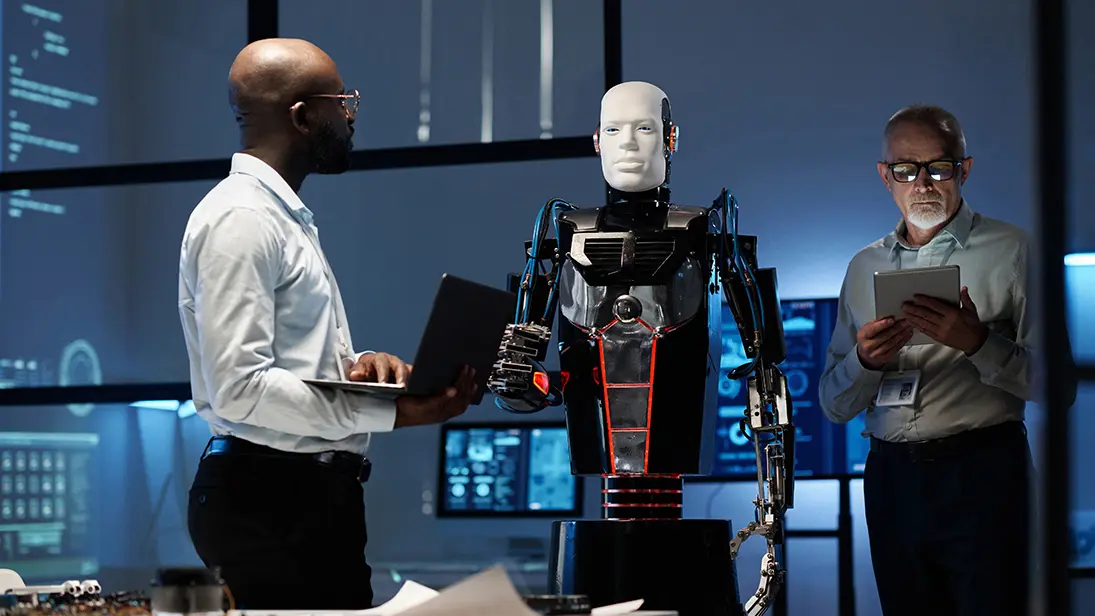AI VS Human Intelligence Future Challenges and Opportunities
Tuesday, May 28, 2024

Explore the future of AI vs. human intelligence, their challenges, opportunities, and the need for responsible integration to enhance our lives.
AI is not a new concept at all. We have had this idea of machines ruling the world since the late 20s, but now, with the recent innovations and advancements in AI, we can slowly see our idea of AI taking shape. This has led to intense debates regarding its potential to rival or even surpass humans or even human intelligence.
These days, the integration of AI into various fields has undoubtedly made our lives better and smarter than ever before. The only dilemma is whether AI will ever become powerful enough to overthrow human intelligence. But before that, we have to understand the future challenges and opportunities that AI brings with its plus points.
To find out the answers we need to get a better glimpse about AI and human intelligence, and thoroughly analyze the impact of artificial intelligence on the future.
Understanding AI and Human Intelligence
To understand the differences between AI and Human Intelligence, it is essential to have a clear understanding of their fundamental characteristics. AI refers to the use of machines to simulate human intelligence processes such as learning, reasoning, and problem-solving. It involves various technologies such as machine learning, natural language processing, and robotics.
However, human intelligence is characterized by complex cognitive abilities including creativity, emotional intelligence, and moral reasoning. Humans possess the capacity for empathy, intuition, and abstract thinking. These traits have enabled us to innovate, collaborate, and adapt to diverse environments throughout history.
Exploring Challenges and Opportunities
Challenges Posed by AI
Job Displacement:
As AI technology advances, there's a risk of automation replacing traditional roles, leading to job loss and economic instability. It is essential to approach this transformation carefully and responsibly while focusing on training and educating the workforce, helping them adapt to the evolving job market. While many roles will end up becoming automated, increased roles in the AI and tech fields will pave the way for determined professionals.
Ethical Dilemmas:
AI technology has sparked concerns about its ethical implications in decision-making processes, especially in healthcare, criminal justice, and warfare. It raises the issue of algorithmic bias, privacy infringement, and accountability that must be addressed to ensure that AI systems operate ethically and responsibly.
Inequality and Accessibility:
The benefits of AI are not equally distributed, leading to disparities in access to technology and opportunities. Socioeconomic factors can exacerbate these inequalities, widening the gap between those who benefit from AI advancements and those who are left behind.
Loss of Human Connection:
Despite its potential to enhance communication and connectivity, AI also has the potential to erode human interaction. Overreliance on AI-driven communication tools may lead to a loss of genuine human connection and empathy, impacting social relationships and mental well-being.
Opportunities Presented by AI
Enhanced Efficiency and Productivity:
AI technologies can boost competitiveness, streamline processes, and drive innovation. According to a report by MIT Sloan Management, 87% of global organizations believe AI technologies will give them a competitive edge. AI technologies offer the potential to revolutionize various industries and enhance the quality of life, from predictive analytics in healthcare to autonomous vehicles in transportation.
Augmented Human Intelligence:
AI can potentially augment human intelligence rather than replace it. By using AI tools for data analysis, problem-solving, and decision-making, humans can improve their cognitive abilities and achieve greater productivity and creativity.
Advancements in Healthcare:
AI-powered technologies are revolutionizing healthcare by enabling more accurate diagnoses, personalized treatment plans, and predictive analytics for disease prevention. From medical imaging to drug discovery, AI is unlocking new possibilities for improving patient outcomes and advancing medical research.
Environmental Sustainability:
AI can contribute significantly to solving global challenges like climate change and resource management. Through optimization algorithms, predictive modeling, and IoT integration, AI systems can help optimize energy consumption, reduce environmental impact, and promote sustainable practices.
New Job Roles and Industries:
While AI may automate certain tasks, it also creates employment in emerging fields such as data science, machine learning engineering, and AI ethics. With AI adoption by organizations set to expand at a CAGR of 37.3% between the years 2023 and 2030 (Grand View Research)*, there will be a growing demand for professionals with a certified AI degree or skills.
The Importance of Collaboration
Instead of AI vs. Human Intelligence, fostering collaboration between the two is essential to unlock their full potential. This collaborative approach empowers individuals and organizations to harness the strengths of both AI and human intelligence, driving innovation and progress.
In many ways, AI and human intelligence complement each other. While AI excels at tasks requiring computational power and data analysis, humans bring a unique perspective and intuition to problem-solving. By combining the strengths of both, we can solve complex challenges more effectively.
Furthermore, collaboration between AI and human intelligence is essential for ensuring that AI systems are developed and deployed responsibly. Human moderation is critical in ensuring AI systems align with ethical and societal norms and do not perpetuate biases or discriminatory outcomes.
Navigating the Future
While navigating the complex terrain of AI and human intelligence, approaching the future with careful consideration and foresight is essential. This requires investing in training and online degree programs in AI that equip individuals with the skills needed to thrive.
Ultimately, the future relationship between AI and human intelligence will be defined by our ability to strike a balance between innovation and responsibility. With programs such as the MS in Applied Artificial Intelligence offered by the University of San Diego online platform, individuals are equipped with the knowledge and expertise to embrace the opportunities presented by AI while mitigating its challenges.
Apply now to create a future where technology enhances rather than diminishes the human experience.
